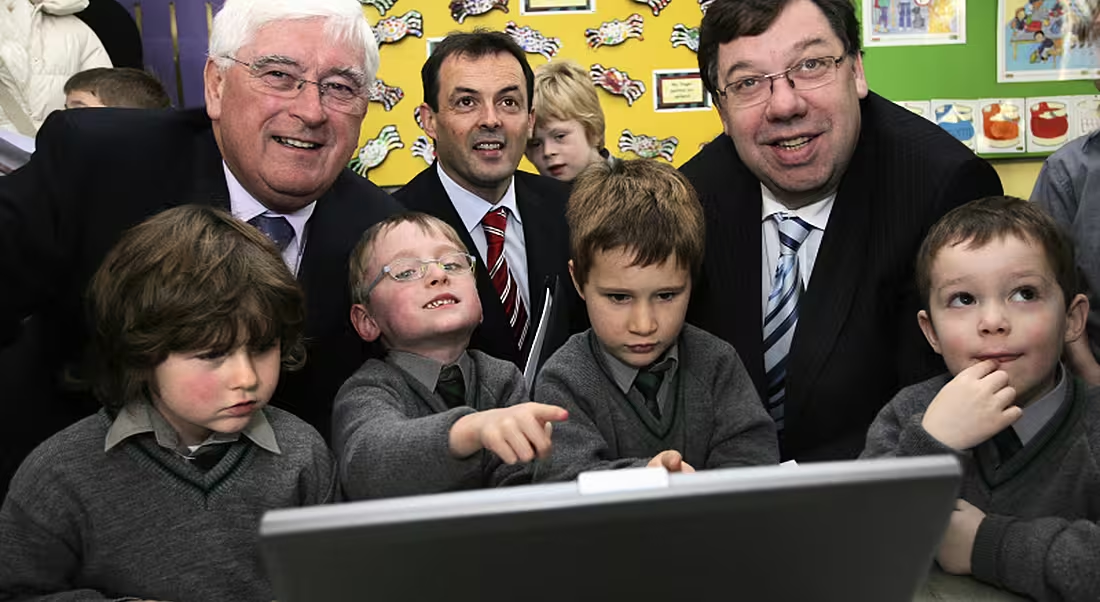The Government of Ireland revealed today that it plans to invest €150 million to kit out Irish schools with the latest computers, software and audio-visual equipment as part of a long overdue injection of technology resources in classrooms across the country.
Under the plan, every classroom in the country is to get a teaching laptop, software and digital projector over the next three years as part of a €150-million plan for smart schools launched by the Taoiseach, Brian Cowen TD.
The new action plan has been produced by the joint advisory group established by the Minister for Education and Science, Batt O’Keeffe TD, and builds on the earlier strategy group report, Investing Effectively in ICT in Schools.
Advisory group
Paul Rellis, managing director of Microsoft Ireland, chaired the advisory group, comprised of members of ICT Ireland, the Telecommunications and Internet Federation, the Irish Software Association, the Department of Education and Science, the Department of Communications, Energy and Natural Resources, and the National Centre for Technology in Education.
“The Government recognises the need for investment in this area and it’s committed to providing funding to support the integration of information communications technology (ICT) in teaching and learning in our schools,” said Cowen, launching the report Smart Schools = Smart Economy in St Joseph’s National School, Terenure.
“Our talented young people, the education sector and ICT are central to developing our Smart Economy. Our children and teenagers are very comfortable with technology so we need to exploit the benefits of ICT in our classrooms to stimulate and enrich teaching and learning and to develop students’ ICT competence. The commitment to invest in ICT in schools is a further expression of the Government’s commitment to the development of innovative ICT in Ireland,” Cowen said.
Vision is shared
O’Keefe said there is now a shared vision on the integration of ICT in the classroom.
“The potential of ICT as a motivational tool to engage students and to enrich and enliven teaching across the curriculum is well recognised. Since publishing the Investing Effectively in ICT in Schools report, I’ve met key players in the business and ICT sectors to explore how best to realise the potential of ICT use in schools. This advisory report contains relevant recommendations in that context.
“Against that background, I’m committed to making funding available for ICT in schools over the next three years. As a first step, €22 million in grants will issue to primary schools before the end of this year. Priority will be given to ensuring that there’s a teaching laptop and digital projector in every classroom.
“Funding for post-primary schools will be made available early in the new year and I’ll be asking them to prioritise the purchase of equipment for classrooms used for the teaching of maths to support the rollout of the curricular reform plan, ‘Project Maths’. This funding is complemented by specific investment in the school building programme for all new classrooms to be fully equipped with ICT equipment. Investment in schools’ ICT infrastructure is an essential component of our strategy to integrate ICT in teaching and learning.”
More key actions
Other key actions include the schools’ broadband programme, the ICT framework developed by the National Council for Curriculum and Assessment and access to relevant digital content and integrated professional development focusing on helping schools to integrate eLearning.
“Going forward, I intend to put in place central procurement arrangements for ICT equipment. In the meantime, schools can avail of the central ICT frameworks and the specific procurement advice being provided to schools.
“The advisory group has recommended that I establish a steering group to drive the implementation of the recommendations in the report. I’ve asked Paul Rellis to chair the group and I’ll be seeking nominations from other stakeholders in the coming weeks,” said O’Keeffe.
Like a road map
Rellis said the report is not simply a vision statement but a plan of action. “It sets out what needs to be done to improve the education system which, in turn, will help Ireland regain its position as a competitive, successful economy. The better use of technology in schools is vital to ensuring that students leave with the skills needed to participate fully in today’s modern economy.
“The report sets out how industry believes this can be done. The significant investment announced by the Taoiseach means schools can begin to make investment decisions immediately. As an industry group, we believe that this investment is the right response to the current economic situation. Investment in education must remain a priority, notwithstanding the current pressures on the public finances.”
The quality of Ireland’s education system is key to economic growth and national competitiveness,” said ICT Ireland’s Paul Sweetman. “Ireland is recognised internationally for its highly educated and skilled workforce. In the past, this has helped us to attract significant foreign direct investment and allowed indigenous enterprise to flourish.
“We need to make better use of technology in the classroom or we’ll lose this competitive advantage. Today’s announcement is an important step in the right direction. It’s vital that all the report’s recommendations are implemented,” Sweetman concluded.
Falling short
While the plan is much needed and must be welcomed, the investment is about €100 million short of the €254 million originally announced by the previous Minister for Education and Science, Mary Hanafin TD, two years ago, and only provides for one laptop per teacher in the classroom and digital projectors rather than whiteboards.
Going-forward plans to ensure that the computing vision extends to what’s in the hands of students, as well as teachers, is important. It is equally important that teacher training and the renewal of equipment is enshrined in any plan moving ahead.
By John Kennedy
Photo: Taoiseach Brian Cowen (right), Minister for Education and Science Batt O’Keeffe TD (left), and Paul Rellis, MD, Microsoft Ireland and chair of the Joint ICT Advisory Group, join students from St Joseph’s National School, Oscar Mulderrig, James Foy, Mathew Flood and Tom Ryland.
Photo by Gary O’ Neill




